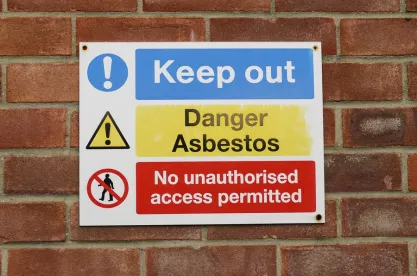-
The Pennsylvania Superior Court’s decision in Roverano provides a degree of assurance that trial courts will be more inclined to apply the Fair Share Act in asbestos litigation, allowing the jury to apportion shares of liability among parties.
-
In ruling that evidence of plaintiffs’ settlements with bankrupt entities must be considered in the apportionment of liability in accordance with the Act, Roverano potentially could result in plaintiffs’ counsel choosing to avoid filing trust claims that, in effect, could dilute the liability apportionment assessed against viable asbestos litigants at trial.
On December 28, 2017, the Pennsylvania Superior Court published an anticipated ruling on whether the Pennsylvania Fair Share Act, 42 Pa. C.S. 7102, applies to strict liability claims in the context of an alleged asbestos-related double lung cancer claim. The Superior Court considered several issues on appeal following a verdict in favor of Plaintiffs William C. Roverano and Jacqueline Roverano, wherein the jury found that Mr. Roverano’s double lung cancer was caused by his exposure to asbestos products of several defendants. The jury apparently did not reach a conclusion as to whether Mr. Roverano’s history of cigarette smoking caused or contributed to his cancers; this oversight being another issue raised by Defendants on appeal.
Prior to trial, Defendants sought a ruling by the trial court that if any liability should be found, the jury would be required to apportion liability to the extent each defendant was determined to have caused harm to the Roveranos. The trial court at the motion in limine stage and later in its post-trial opinion refused to apply the Fair Share Act to this case, because “the jury was not presented with evidence that would permit an apportionment to be made by it.” Roverano, 2017 Pa.Super. 415, citing Trial Ct., Op., 7/27/15 at 9 – 10.
The Superior Court ruled that the trial court erred as a matter of a law by refusing to apply the Fair Share Act, since its main purpose was to make joint and several liability inapplicable to most cases. Id. The Court explained that the Fair Share Act explicitly applies to tort cases in which “recovery is allowed against more than one person, including acts for strict liability.” Id., citing to 42 Pa. C.S § 7102(a.1)(1). Further, the Court emphasized that nothing in the Act makes an exception for strict liability cases, let alone strict liability cases involving asbestos.
Not only has the Superior Court clarified that the Fair Share Act was and is intended to apply to strict liability claims like those raised by the Roverano’s asbestos suit, the Court also determined that the jury must be permitted to consider evidence of any settlements by the Roveranos with bankrupt entities in evaluating and apportioning liability. The Superior Court was careful to explain that such a consideration concerning bankrupt entities is not forbidden by the bankruptcy code. In conclusion, the Superior Court remanded the case for a new trial on the question of apportionment of liability.
In a concurring and dissenting opinion by Judge Solano, he agreed with the majority’s application of the Fair Share Act and remanding the case for a new trial on apportionment, but also suggested that the case should be remanded for a consideration of liability as well, because the jury charge failed to explain what proof of causation was needed to establish liability and was too confusing.



 />i
/>i
